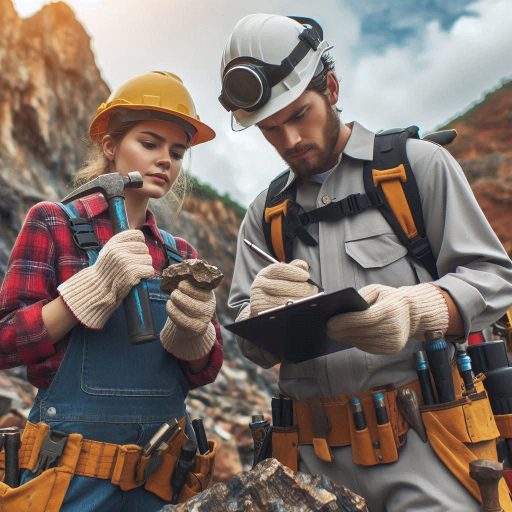Introduction
The Role of Geological and Petroleum Technicians
Geological and petroleum technicians are essential in the exploration and extraction of natural resources.
They conduct fieldwork, gather samples, and analyze geological formations to support drilling and production efforts.
Their duties involve operating specialized equipment and following rigorous safety protocols to ensure accurate data collection and operational efficiency.
By providing crucial support to geologists and engineers, they help guide decision-making processes and optimize resource extraction.
Importance of Having Essential Skills in This Field
Essential skills are vital for success in the field of geological and petroleum technology.
Technical expertise enables technicians to accurately interpret complex data and operate sophisticated equipment.
Proficiency in data analysis and adherence to safety protocols are critical for ensuring the accuracy and safety of operations.
Additionally, strong communication and teamwork skills enhance collaboration with other professionals, contributing to the overall success of projects.
Mastery of these skills not only improves job performance but also supports career growth and adaptation in a constantly evolving industry.
Understanding Geology Concepts
Geological and petroleum technicians must grasp key geology concepts.
This foundational knowledge enables them to excel in their roles.
Understanding geology begins with recognizing Earth’s structure.
Technicians must comprehend the processes shaping our planet’s surface and subsurface.
A solid understanding of geology concepts includes studying plate tectonics.
Technicians need to know how Earth’s crust moves and shifts.
This knowledge helps them predict and identify areas rich in resources.
By understanding the Earth’s layers, technicians can better analyze rock formations and mineral deposits.
Knowledge of Rock Formations, Minerals, and Natural Resources
Technicians must identify different rock types, such as igneous, sedimentary, and metamorphic rocks.
Each rock type has distinct characteristics, influencing where oil, gas, and minerals are found.
Technicians need to understand how these rocks form and change over time.
Identifying minerals within rock formations is equally important.
Technicians must recognize key minerals associated with valuable resources like oil and gas.
This skill allows them to assess potential drilling sites more accurately.
Understanding the properties of these minerals, such as their hardness and density, helps in determining the quality of the resource.
Natural resources, including oil, gas, and minerals, are the primary focus of geological and petroleum technicians.
They need to understand how these resources are formed and where they are likely to be found.
This involves studying sedimentary basins and other geological structures where oil and gas accumulate.
Technicians must assess the potential yield of these resources by analyzing rock samples and other geological data.
Ability to Interpret Geological Maps and Data
Interpreting geological maps is another essential skill for these technicians.
These maps provide a visual representation of the Earth’s subsurface structures.
Technicians must read and interpret these maps accurately to identify potential drilling sites.
Understanding contour lines, fault lines, and other geological features is crucial in this process.
Data interpretation goes hand-in-hand with map reading.
Technicians must analyze data from various sources, such as seismic surveys and well logs.
They must understand how to integrate this data to make informed decisions.
By accurately interpreting data, technicians can predict the location and size of oil and gas deposits.
Basically, geological and petroleum technicians need a strong grasp of geology concepts.
They must understand rock formations and identify minerals within these formations.
Additionally, interpreting geological maps and data is crucial for their success.
These skills enable technicians to locate and assess valuable natural resources efficiently.
Mastery of these essential skills ensures that geological and petroleum technicians contribute effectively to the exploration and extraction of Earth’s resources.
Read: Networking Tips for Surveying and Mapping Professionals
Proficiency in Technical Software
Technical software proficiency is essential for managing and analyzing large datasets.
Technicians use various software programs for tasks such as seismic data analysis, well log interpretation, and reservoir simulation.
Mastery of these tools allows technicians to process complex data efficiently and produce reliable results.
Being adept with software such as MATLAB, Python, or specialized industry tools can significantly improve a technician‘s productivity and accuracy in their work.
Familiarity with Software Used for Data Analysis and Modeling
Familiarity with software for data analysis and modeling is crucial.
Technicians use software programs to create and analyze detailed models of geological formations.
These models help in predicting the behavior of natural resources and assessing their potential.
Programs like Microsoft Excel, R, or specialized geological modeling software enable technicians to process and interpret data effectively.
Understanding how to manipulate and visualize data through these tools supports better decision-making and enhances the accuracy of geological assessments.
Skills in GIS Mapping and 3D Modeling for Geological Surveys
Skills in Geographic Information Systems (GIS) mapping and 3D modeling are critical for geological surveys.
GIS technology allows technicians to analyze spatial data and create detailed maps of geological features.
This capability is essential for visualizing and interpreting complex geological structures.
3D modeling further enhances their ability to represent subsurface conditions accurately.
Software like ArcGIS and 3D modeling tools such as GeoMod or Petrel are commonly used to create detailed visualizations of geological formations.
These skills enable technicians to better plan and execute exploration and extraction operations.
Essentially, proficiency in technical software, familiarity with data analysis and modeling tools, and skills in GIS mapping and 3D modeling are essential for geological and petroleum technicians.
Mastery of these technologies empowers technicians to analyze complex data, create accurate models, and visualize geological features effectively.
By leveraging these skills, technicians can enhance their contributions to resource exploration and management, ensuring more precise and efficient operations.
Read: Recent Trends in Surveying and Mapping Technologies
Fieldwork Experience
Fieldwork experience is a cornerstone of a successful career as a geological and petroleum technician.
This hands-on experience allows technicians to apply theoretical knowledge in real-world settings.
Engaging directly with the environment and conducting practical surveys are vital components of their role.
Hands-On Experience in Conducting Geological Surveys and Analysis
Hands-on experience is crucial for conducting geological surveys and analysis.
Technicians spend considerable time in the field, examining rock formations, collecting samples, and analyzing geological structures.
Practical experience in these tasks helps technicians develop a keen eye for detail and accuracy.
They learn to identify various rock types and geological features on-site, which is essential for effective resource exploration.
Ability to Collect Samples, Measure Soil Properties, and Analyze Geological Formations
The ability to collect samples and measure soil properties is fundamental.
Technicians must gather soil and rock samples from various locations to analyze their composition.
They use tools such as core drills, hand tools, and sampling devices to obtain representative samples.
Measuring soil properties, including texture, moisture, and density, provides valuable data for assessing resource potential and soil suitability.
Analyzing geological formations requires technicians to evaluate the collected samples and interpret their characteristics.
They assess factors such as mineral content, structural features, and rock formation processes.
This analysis helps in understanding the geological history and potential of the surveyed area.
By integrating field data with laboratory results, technicians can provide accurate assessments of resource deposits and geological conditions.
All in all, fieldwork experience, hands-on techniques, and practical skills are essential for geological and petroleum technicians.
Their ability to conduct surveys, collect and analyze samples, and measure soil properties directly impacts the accuracy and effectiveness of their work.
These skills ensure that technicians can successfully translate field observations into actionable insights for resource exploration and management.
Read: Safety Tips for Field Surveying Technicians

Communication Skills
Strong communication skills are essential for geological and petroleum technicians.
Effective communication ensures smooth operations, collaborative teamwork, and clear presentation of findings.
Technicians need to interact with various stakeholders, including team members, supervisors, and clients, making communication a key component of their success.
Effective Communication with Team Members, Supervisors, and Clients
Effective communication with team members, supervisors, and clients is crucial in the field.
Technicians must convey technical information clearly and accurately to colleagues working on the same project.
This clarity helps in coordinating tasks and ensuring that everyone is aligned with project goals.
Regular updates and discussions with supervisors are also important for staying on track and addressing any issues that arise.
When dealing with clients, technicians must communicate findings and recommendations in a way that is understandable and relevant to non-specialists.
They need to translate complex technical data into actionable insights, ensuring that clients can make informed decisions based on the information provided.
Ability to Present Findings and Reports in a Clear and Concise Manner
The ability to present findings and reports clearly and concisely is a critical skill.
Technicians must prepare detailed reports that summarize their analyses, findings, and recommendations.
These reports should be well-organized, with data presented in a manner that is easy to interpret.
Clear visual aids, such as charts and graphs, can enhance understanding and highlight key points.
Effective presentation of findings also involves verbal communication skills.
Technicians often present their results to both technical and non-technical audiences.
Being able to articulate complex information in a straightforward manner ensures that the audience comprehends the key aspects of the report.
In short, communication skills are vital for geological and petroleum technicians.
Effective interaction with team members, supervisors, and clients fosters collaboration and ensures that projects progress smoothly.
The ability to present findings and reports clearly and concisely is essential for conveying technical information and supporting decision-making.
Mastering these communication skills enhances the technician’s ability to contribute to successful and efficient project outcomes.
Read: Top Surveying and Mapping Technician Employers
Critical Thinking and Problem-Solving Abilities
Critical thinking and problem-solving abilities are essential for geological and petroleum technicians.
These skills enable technicians to navigate complex challenges, analyze data effectively, and adapt to dynamic field conditions.
Mastery of these competencies ensures that technicians can address issues promptly and maintain the accuracy of their work.
Analytical Skills to Identify Potential Issues and Find Solutions
Analytical skills are crucial for identifying potential issues and finding effective solutions.
Technicians must analyze geological data, interpret results, and detect anomalies or discrepancies.
This involves examining trends, patterns, and relationships within the data.
For instance, if a sample shows unexpected mineral content, technicians must investigate the cause and determine how it impacts the overall assessment.
Effective problem-solving requires a systematic approach.
Technicians need to evaluate various factors that might contribute to an issue, such as equipment malfunction or unexpected geological conditions.
By employing critical thinking, they can develop and implement strategies to resolve problems efficiently.
This might involve adjusting survey techniques, recalibrating instruments, or revising data analysis methods.
Transform Your Career Today
Unlock a personalized career strategy that drives real results. Get tailored advice and a roadmap designed just for you.
Start NowAbility to Adapt to Changing Conditions in the Field
The ability to adapt to changing conditions in the field is a vital skill for technicians.
Fieldwork often involves unpredictable factors, such as weather changes, equipment failures, or unforeseen geological complexities.
Technicians must remain flexible and responsive to these changes to ensure that the work progresses smoothly.
Adapting to field conditions may involve modifying planned procedures or exploring alternative methods.
For example, if adverse weather conditions hinder access to a site, technicians might need to adjust their schedule or employ different techniques to gather necessary data.
Quick thinking and adaptability help technicians overcome challenges and maintain the integrity of their research.
On final note, critical thinking and problem-solving abilities are crucial for geological and petroleum technicians.
Analytical skills enable them to identify and address potential issues effectively, while adaptability ensures they can handle changing conditions in the field.
Mastery of these skills supports accurate data interpretation and successful problem resolution, contributing to the overall success of geological and petroleum projects.
Delve into the Subject: Interview Tips for Environmental Technician Jobs
Learn More: Latest Research Topics in Computer Engineering
Safety Training and Awareness
Safety training and awareness are fundamental for geological and petroleum technicians working in potentially hazardous environments.
Ensuring safety not only protects individuals but also enhances overall project efficiency.
Technicians must be well-versed in safety protocols, emergency response, and first aid procedures to manage risks effectively.
Understanding of Safety Protocols and Procedures in Hazardous Work Environments
Understanding safety protocols and procedures is crucial in hazardous work environments.
Technicians work in settings that may involve heavy machinery, toxic substances, or unstable geological formations.
Knowing and following established safety protocols helps prevent accidents and injuries.
This includes using personal protective equipment (PPE), adhering to site-specific safety regulations, and following proper procedures for handling hazardous materials.
Technicians should be familiar with the safety guidelines for equipment operation and site maintenance.
Regular safety training ensures they are up-to-date with the latest safety standards and practices.
Adhering to these protocols reduces the risk of incidents and contributes to a safer work environment.
Knowledge of Emergency Response and First Aid Procedures
Knowledge of emergency response and first aid procedures is vital for handling accidents and medical emergencies.
Technicians must be prepared to respond quickly and effectively in case of an incident.
This includes knowing how to manage injuries, perform basic first aid, and initiate emergency procedures.
Emergency response training typically covers actions to take in various scenarios, such as chemical spills, fires, or equipment malfunctions.
Technicians should know how to use emergency equipment, such as fire extinguishers and first aid kits, and be familiar with evacuation procedures and emergency contact information.
Having first aid skills enables technicians to provide immediate care until professional medical help arrives.
This training includes CPR, wound care, and managing injuries related to fieldwork.
Being equipped with these skills enhances safety and ensures a rapid response to emergencies.
In summary, safety training and awareness are crucial for geological and petroleum technicians.
A thorough understanding of safety protocols and procedures helps mitigate risks in hazardous environments.
Knowledge of emergency response and first aid procedures ensures technicians can handle incidents effectively and maintain a safe work environment.
Mastery of these safety skills is essential for protecting both personnel and project outcomes.
Gain More Insights: Wind Turbine Technician Safety Guidelines
See Related Content: Laboratory Technician Salary Insights
Conclusion
The Importance of Essential Skills for Geological and Petroleum Technicians
Essential skills for geological and petroleum technicians are fundamental for achieving success in this intricate field.
Mastering technical knowledge allows for accurate analysis of geological formations and petroleum reserves.
Proficiency in data analysis ensures precise interpretation of complex data sets, while adherence to safety protocols safeguards both personnel and equipment.
Strong communication and teamwork skills facilitate effective collaboration and problem-solving in challenging environments.
These skills are integral to driving successful exploration and production, making them indispensable for professionals in the industry.
Continuous Learning and Skill Development in the Field
The geological and petroleum sectors are continually evolving with technological advancements and new methodologies.
Therefore, ongoing learning and skill development are crucial for staying ahead.
Embrace opportunities for further education and training to keep up with industry changes and enhance your expertise.
Continuous professional growth not only improves job performance but also opens doors for career advancement.
By committing to lifelong learning, you ensure adaptability and long-term success in a dynamic and competitive field.




